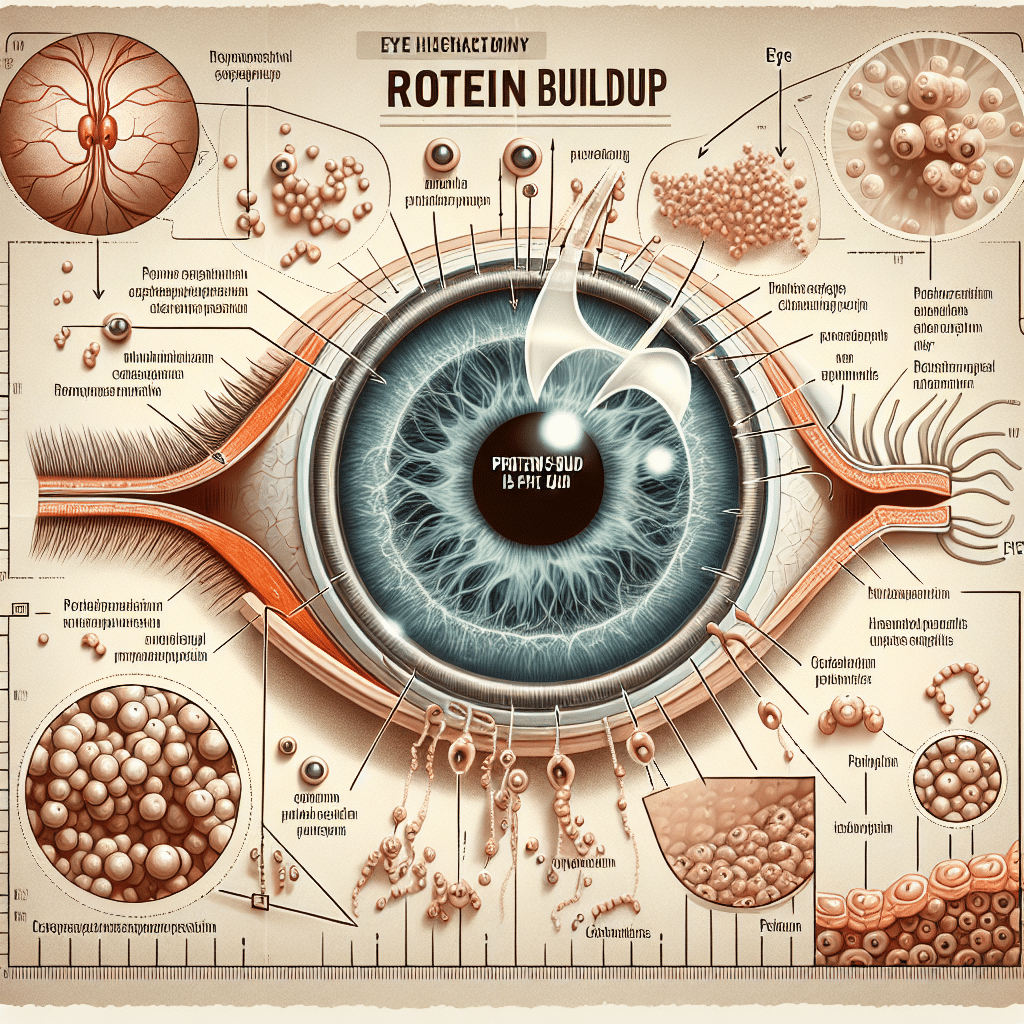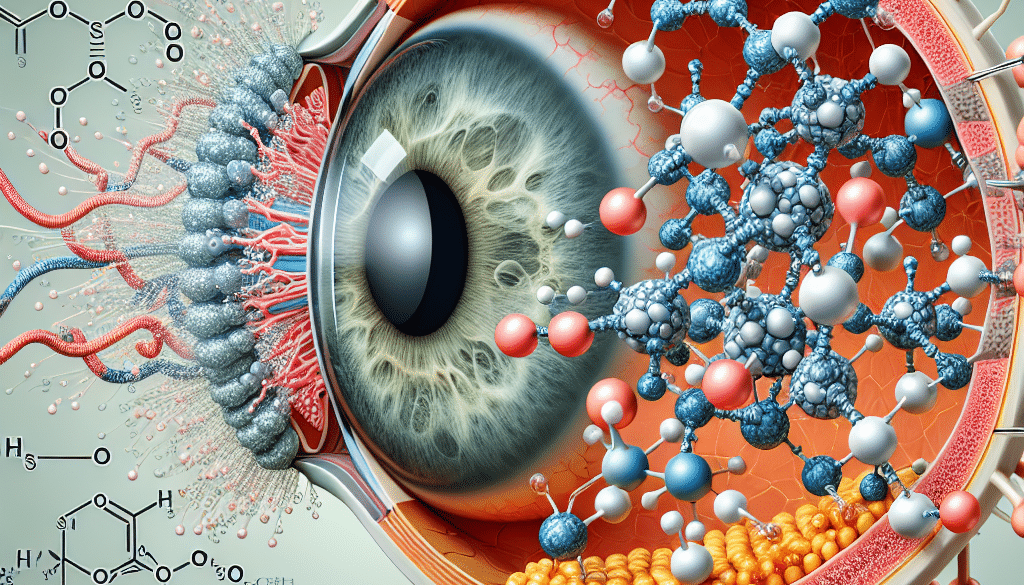Eye Health: Understanding Protein Buildup
-
Table of Contents
- Eye Health: Tackling Protein Buildup for Clearer Vision
- Understanding Protein Buildup in the Eyes
- Formation of Cataracts
- Contact Lens-Related Protein Deposits
- Causes of Protein Buildup in the Eyes
- Effects of Protein Buildup on Vision
- Prevention and Management of Protein Buildup
- Maintaining a Healthy Lifestyle
- Proper Contact Lens Care
- Regular Eye Examinations
- Treatment Options
- Case Studies and Statistics
- Conclusion: Key Takeaways for Healthy Eyes
- Recommended Protein Products from ETprotein
Eye Health: Tackling Protein Buildup for Clearer Vision

Our eyes are complex organs that require a delicate balance of various components to function correctly. One aspect of eye health that often goes unnoticed is the role of proteins in maintaining clear vision. Protein buildup in the eyes can lead to a range of issues, from mild discomfort to severe vision impairment. In this article, we will delve into the intricacies of protein buildup in the eyes, its causes, effects, and the steps you can take to prevent or manage this condition.
Understanding Protein Buildup in the Eyes
Proteins are essential molecules that play a critical role in the structure and function of all living organisms, including the human eye. However, when proteins accumulate abnormally, they can cause problems. In the eye, protein buildup can manifest in several ways, such as the formation of cataracts or the development of deposits on contact lenses.
Formation of Cataracts
Cataracts are a common condition where the lens of the eye becomes cloudy due to protein clumping together. This prevents light from passing through clearly, leading to blurred vision. Cataracts are often associated with aging, but they can also result from genetic factors, diabetes, smoking, and prolonged exposure to UV rays.
Contact Lens-Related Protein Deposits
For contact lens wearers, protein buildup can occur on the surface of the lenses. Proteins from the tear film can adhere to the lens material, creating deposits that can cause discomfort, reduce lens effectiveness, and increase the risk of eye infections.
Causes of Protein Buildup in the Eyes
Several factors contribute to the accumulation of proteins in the eyes, including:
- Age: As we age, the proteins in the eye lens can denature and aggregate, leading to cataracts.
- Diet and Lifestyle: Poor nutrition, smoking, and excessive alcohol consumption can increase the risk of protein buildup.
- Medical Conditions: Diseases such as diabetes can accelerate the process of protein aggregation in the eye.
- Environmental Factors: Prolonged exposure to sunlight and UV radiation can contribute to protein changes in the eye lens.
Effects of Protein Buildup on Vision
Protein buildup can have a range of effects on vision, from minor irritations to significant visual impairment. Symptoms may include:
- Blurred or cloudy vision
- Difficulty seeing at night
- Halos around lights
- Increased sensitivity to glare
- Changes in color perception
In severe cases, protein buildup can lead to blindness if left untreated.
Prevention and Management of Protein Buildup
While some factors like aging cannot be controlled, there are steps you can take to prevent or manage protein buildup in the eyes:
Maintaining a Healthy Lifestyle
Eating a balanced diet rich in antioxidants, wearing UV-protective sunglasses, and avoiding smoking can help reduce the risk of cataract formation.
Proper Contact Lens Care
Contact lens wearers should follow proper hygiene practices, such as regular cleaning and disinfecting of lenses, to prevent protein deposits.
Regular Eye Examinations
Regular check-ups with an eye care professional can help detect and address protein buildup early on.
Treatment Options
When protein buildup leads to cataracts, surgery is often the most effective treatment. For contact lens-related issues, switching to daily disposable lenses or lenses with advanced materials may help.
Case Studies and Statistics
Studies have shown that cataract surgery is one of the most successful procedures, with a high rate of improved vision post-operation. According to the World Health Organization, cataract removal is the most performed ophthalmic procedure, restoring vision to millions of patients each year.
In terms of contact lenses, advancements in lens technology have significantly reduced protein deposit issues. A study published in the “Journal of Ophthalmology” found that silicone hydrogel lenses, for example, are less prone to protein buildup compared to traditional hydrogel lenses.
Conclusion: Key Takeaways for Healthy Eyes
Protein buildup in the eyes can lead to various vision problems, but understanding the causes and effects can empower individuals to take proactive steps in maintaining eye health. By adopting a healthy lifestyle, protecting eyes from UV light, practicing good contact lens hygiene, and seeking regular professional eye care, one can significantly reduce the risks associated with protein buildup. For those already affected, modern medical interventions offer effective solutions to restore clear vision.
Recommended Protein Products from ETprotein
If you’re looking for high-quality protein products, ETprotein offers a range of plant-based proteins that are ideal for maintaining overall health, including eye health. Their organic rice protein, clear pea protein, and other plant-based options are excellent choices for those seeking to incorporate more protein into their diet without the risks associated with animal-based proteins.
About ETprotein:
ETprotein, a reputable plant protein vegan protein Chinese factory manufacturer and supplier, is renowned for producing, stocking, exporting, and delivering the highest quality organic bulk vegan protein and plant proteins. They include Organic rice protein, clear rice protein, pea protein, clear pea protein, watermelon seed protein, pumpkin seed protein, sunflower seed protein, mung bean protein, peanut protein etc. Their offerings, characterized by a neutral taste, non-GMO, allergen-free attributes, cater to a diverse range of industries. They serve nutraceutical, pharmaceutical, cosmeceutical, veterinary, as well as food and beverage finished product distributors, traders, and manufacturers across Europe, USA, Canada, Australia, Thailand, Japan, Korea, Brazil, and Chile, among others.
ETprotein specialization includes exporting and delivering tailor-made protein powder and finished nutritional supplements. Their extensive product range covers sectors like Food and Beverage, Sports Nutrition, Weight Management, Dietary Supplements, Health and Wellness Products, and Infant Formula, ensuring comprehensive solutions to meet all your protein needs.
As a trusted company by leading global food and beverage brands and Fortune 500 companies, ETprotein reinforces China’s reputation in the global arena. For more information or to sample their products, please contact them and email sales(at)ETprotein.com today.












